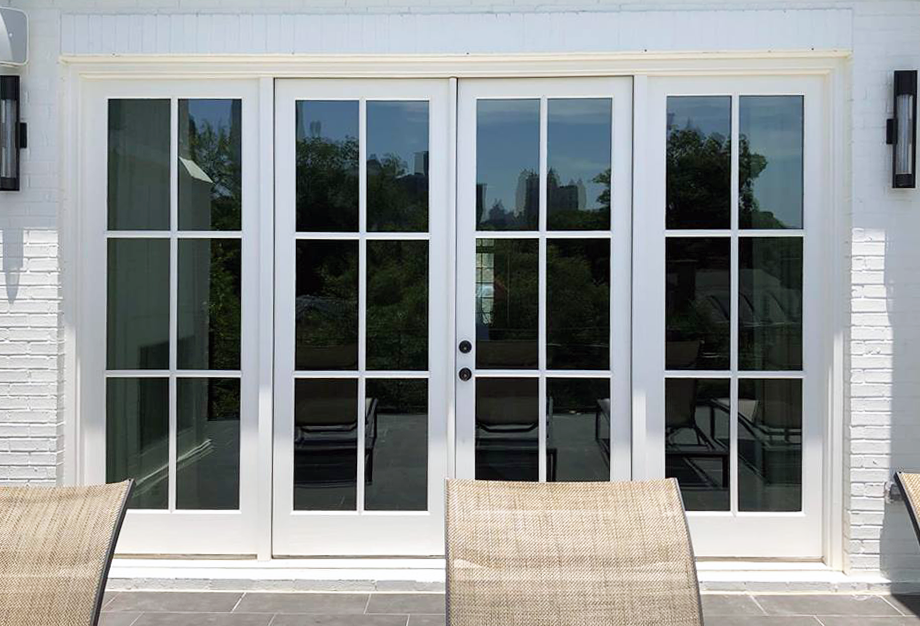How Residential Window Tint Enhances Your Home's Aesthetic Appeal
Wiki Article
Just How Residential Home Window Tinting Boosts Your Home's Power Performance
Residential home window tinting provides an engaging solution for house owners looking for to improve power effectiveness within their living rooms. By using specialized films to windows, it properly lowers warmth transfer, thereby stabilizing indoor temperature levels and lessening the need for too much heating or cooling.Comprehending Home Window Tinting
Understanding window tinting is essential for home owners seeking to enhance both convenience and energy effectiveness in their home. Residential Window Tint. Window tinting includes the application of a slim film to the inside or outside surface area of glass windows. This film can significantly regulate the quantity of sunlight and heat that goes into a home, therefore affecting indoor climate conditionsThere are various sorts of home window tinting movies available, each with unique homes. Dyed movies take in solar power, while reflective films deflect it away from the glass surface area. Ceramic films offer a balance of visibility and warm denial, making them a preferred choice among homeowners. The effectiveness of window tinting is typically measured by its Visible Light Transmission (VLT) percentage, which indicates just how much light can pass with the film.
Benefits of Power Efficiency
Window tinting not only improves appearances however additionally plays a significant role in boosting energy effectiveness within household areas. By lowering warmth transfer with windows, colored movies create an extra secure interior environment, which can lead to considerable decreases in energy consumption for cooling and heating. This energy performance translates right into lower energy bills, offering homeowners with significant long-lasting cost savings.
Additionally, window tinting boosts the convenience of living rooms. By reducing glow and obstructing harmful UV rays, colored home windows develop a more positive setting, which can cause boosted wellness for passengers. The security versus UV rays likewise helps protect furniture and floor covering from fading, adding to the longevity of home products.
Just How Tinting Works
Tinting films run through a mix of sophisticated materials and innovations developed to manage the amount of solar power entering a home. Largely composed of polyester, these movies typically integrate ceramic or metallic bits that show and take in warmth. This dual ability permits them to considerably lower the penetration of ultraviolet (UV) rays and infrared radiation while allowing visible light to go through.The efficiency of window tinting is measured by its solar heat gain coefficient (SHGC), which shows exactly how much solar power is sent with the home window. Lower SHGC values are more effective as they represent better heat rejection. Additionally, window colors can feature a selection of tones, permitting property owners to personalize their aesthetic official statement preferences while enhancing energy performance.
Moreover, these films work as a barrier, stopping warmth loss during chillier months by reflecting indoor heat back right into the home. This thermal insulation result complements the cooling benefits gotten during warmer months, adding to a balanced interior environment year-round. By managing solar energy efficiently, household window tinting not just boosts convenience but additionally plays a crucial duty in reducing power usage and decreasing energy expenses.
Choosing the Right Color

There are numerous sorts of window films available, consisting of dyed, metalized, and ceramic. Colored films are discover this affordable however might have limited toughness. Metalized movies provide much better warm being rejected however can disrupt digital signals. Ceramic movies offer exceptional warmth control without endangering exposure and are extremely long lasting, making them a preferred selection.
Noticeable light transmission (VLT) is another vital variable, as it suggests the quantity of all-natural light that can pass via the tinted glass. Homeowners must choose a color with a VLT that complements their lights choices while still providing ample website link glare reduction.
Additionally, examining the solar warm gain coefficient (SHGC) can aid establish how well a tint can obstruct warm from sunshine. A reduced SHGC suggests much better warm control, inevitably boosting energy effectiveness.
Installation and Maintenance Tips
Appropriate installation and maintenance are important parts in taking full advantage of the advantages of domestic home window tinting. Experts additionally utilize specialized devices and methods, which can boost the durability and effectiveness of the tint.Complying with setup, maintenance is crucial to extend the life of the window movie. It is suggested to wait at least 30 days before cleansing the colored windows to enable the glue to treat completely.
In addition, routine assessments are useful. Look for any type of peeling or bubbling, which could indicate improper installment or wear in time - Residential Window Tint. Attending to these concerns immediately can prevent more damage and keep power efficiency. By adhering to these installment and upkeep tips, homeowners can guarantee their home window tinting continues to offer significant power financial savings and comfort for many years to come.
Conclusion
In final thought, property home window tinting serves as an effective service for enhancing power effectiveness within homes. By reducing warm transfer and blocking unsafe UV rays, window movies contribute to lower power intake and enhanced indoor convenience.Window tinting entails the application of a slim movie to the interior or exterior surface area of glass windows. By decreasing warmth transfer through home windows, tinted films develop an extra secure indoor climate, which can lead to considerable reductions in energy usage for home heating and cooling.The performance of window tinting is measured by its solar warm gain coefficient (SHGC), which shows exactly how much solar power is transferred via the home window. By taking care of solar energy successfully, household home window tinting not just enhances convenience yet likewise plays a crucial function in reducing power consumption and lowering utility expenses.
By reducing warmth transfer and obstructing dangerous UV rays, home window movies add to lower energy usage and improved interior comfort.
Report this wiki page